Written by: Humane Pennsylvania CEO & President, Karel Minor
“Without people, you’re nothing.” This quote by the late, great Joe Strummer hangs on the wall of Humane PA’s conference room along with our Mission Statement. It’s a reminder that while Humane Pennsylvania exists to help animals in need, we can only do that through people’s assistance, partnership, and support. It’s also a reason for concern on the horizon and why this year’s review will look back a little further than usual.
Not too long ago, the universal sentiment- and it’s still all too common today- is that people were the primary problem facing animals. Animal welfare was suspicious, barrier erecting, and often openly hostile toward the public. Adopters were mercilessly grilled, those asking for help were judged by inconsistent and arbitrary standards, and facts and data had no place in a world that ran on feelings and personal opinions. It was a good place for people to engage, but it certainly wasn’t a good place for animals.
Thankfully, this has started to change to benefit animals and those who want to help them. Humane PA has been a leader in promoting a model of services that views people as the solution to the problems facing animals. While that doesn’t seem radical now, this approach was highly controversial and actively opposed in the recent past. The most vitriolic opposition came from the animal welfare community itself.
When Humane PA created Ani-Meals on Wheels (now Spike’s Pet Pantry), one of the nation’s first pet food support programs, we received hate mail from other animal shelters for giving away food to people whom they felt shouldn’t have pets because they couldn’t afford them. Today, pet food pantries are ubiquitous and serve millions of people in need trying to provide for their pets during challenging economic times.
When Humane PA created PetNet, our emergency foster program that provided temporary housing for those fleeing domestic violence or facing medical or other personal crises, we had pushback from within our own staff. They questioned why we would take space from “real” homeless pets for people who should work out their issues or give up their pets. Today, relinquishment prevention foster programs are standard practice in animal welfare.
When Humane PA created the “Free to a Great Home” fee-waived adoption program, the very first formal, public program of its kind in the country, it was widely derided…again, especially within the animal welfare community, as being dangerous for animals. Wouldn’t people who didn’t pay for them mistreat or neglect them? Spoiler alert: No. The data never supported that belief. In fact, the most dangerous place in America for an animal to be was an animal shelter. Fee-waived adoptions saved lives, reduced euthanasia, and had successful placement rates as good or better than fee-based adoptions. Fee-waived adoption events are also now ubiquitous and standard practice within animal welfare.
When Humane PA opened the first full-service non-profit veterinary practice in Pennsylvania (back when you could count all such practices in the nation on two hands and two feet), we were threatened with lawsuits and legislation by the organizations representing the veterinary community. Fortunately, they came to see the error- and pointlessness- in these anti-competitive and anti-pet caretaker ways, and we’ve mended fences. We are now one of the largest veterinary practices in the region, we are nationally accredited, and the number of non-profit veterinary practices is exploding nationwide.
I’m taking this time to look backward, not just to brag about how Humane PA has been a leader in all these areas. OK, maybe a little. But these are reminders that time and again, Humane PA has chosen paths that were only sometimes easy or popular because they were the best choices to help animals. While we may have recognized that these were the right roads to take, we could only walk them because we had people’s steadfast support. A board of directors empowering staff to break new ground, donors willing to support the work financially, and volunteers standing shoulder to shoulder with staff to do the job. Without these people, these efforts could have amounted to nothing. With their help, scrappy little Humane PA (once scrappy little Humane Society of Berks County) became a national leader in animal welfare and helped redefine how organizations nationwide help animals.
I know that’s a bold claim, but a real one, particularly in non-profit veterinary services. When we started our practice nearly twenty years ago, it was a unicorn. No longer. In October, Humane Pennsylvania staff was asked to present and moderate three workshops and panels at the first national Access to Veterinary Care (AVC) Conference. Hosted by the University of Minneapolis Veterinary School and ASPCA, hundreds of attendees represented hundreds of existing non-profit vet practices of every shape and size and came together to share and learn. HPA was recognized as one of the oldest and most comprehensive veterinary programs and is still on the cutting edge of program development.
I was incredibly proud of the animal welfare community that has come around to seeing that access to vet care is one of the most effective ways to improve the lives of animals. I was also very proud of our staff for leading the way to help define and create this new approach. Before HSUS’ Pets For Life existed or big national foundations and organizations provided a penny of funding for access to vet care efforts, before there was enough critical mass to inspire a national conference on AVC work, Humane PA was doing the work, promoting the approach, and giving AVC workshops at any conference or meeting that would have us.
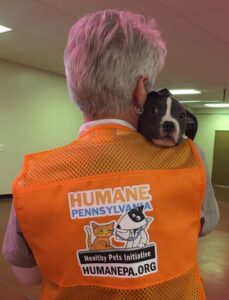
These efforts, particularly in combination with spay/neuter efforts and the change in expectations commonly summed up as the “no-kill” philosophy, have resulted in 90% fewer animals euthanized in shelters than in 1970. The outcomes are even better in some areas of the US and Berks and Lancaster Counties. Since 2005, shelter euthanasia at our Berks and Lancaster shelters has declined by 98%- 10,000 animals a year. During the same period, HPA shelters had an 82% decrease in intake, thanks to improved relinquishment prevention services, access to pre-emptive services, and changes in the community’s expectations.
Shelters in our region and across the country now face routine periods of having too few animals available for adoption to meet the need! Humane Pennsylvania and many other organizations are focusing more resources on access to veterinary care and social service supports than on shelter programs. Some organizations are even considering divesting themselves of their shelter divisions entirely to focus on more cost-effective and broadly impactful programs like veterinary services.
And this is where I finally bring it back to my concern and how it informs our work in the new year. All these great programs and services have profoundly impacted positive incomes for animals and do so more affordably and sustainably for animal welfare organizations. Humane Pennsylvania has been redirecting our resources to address the increasing needs of pet caretakers asking for something other than a shelter to surrender an animal. Giving up a pet to an animal shelter should never have been the first, only, and easiest option for a caretaker in need. And that’s precisely what it was- what animal shelters made it– for nearly 100 years. However, there will always be a need for a safe haven for temporarily or permanently homeless pets. There will be a need for a place where people can bring a pet when they are genuinely at the end of the capacity or ability to keep it. We cannot throw shelters on the scrap heap of other harmful and counterproductive programs or beliefs (remember when you couldn’t adopt black cats at Halloween because…Satanists?) just because it’s less fun, more expensive, and has a more negligible impact than all our new-fangled access to vet care work.
However, sheltering needs to be put in the proper context of need, resources, and effectiveness, combined with supportive programs. Our goal should be to keep every pet at home, using every tool in the kit, but access to a shelter when all else fails has to be an option.
That’s why two years ago, we opened a two million dollar investment in sheltering, the Freedom Center for Animal Life-Saving, which featured dramatically improved animal and adoption space. But it also houses expanded veterinary services for sheltered animals and is
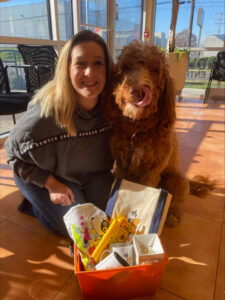 the first non-profit walk-in animal clinic in the region. The Healthy Pets Walk-In Clinic, which opened in May of 2022, provides vital vaccination and wellness care at 40% off standard veterinary costs, making it more accessible to those with limited economic resources. It recently treated its 1,000th client.
the first non-profit walk-in animal clinic in the region. The Healthy Pets Walk-In Clinic, which opened in May of 2022, provides vital vaccination and wellness care at 40% off standard veterinary costs, making it more accessible to those with limited economic resources. It recently treated its 1,000th client.
Last year HPA expanded its Healthy Pets Initiative Pay-What-You-Can vaccine and microchip clinics to the veterinary desert of Lancaster City. Although it required a significant scaling back of our general practice hours at the HVH Lancaster hospital due to the ongoing national veterinary shortage, we knew it was the right way to get the most needed help to the most pets cared for by the population with the highest need. Also, if you are a veterinarian looking to work someplace that is changing the world, call me!

Next year, we will be doing even more. In 2023, Humane PA will open a Community Resource Center in Lancaster to mirror the work done by our Reading Community Resource Center. Pet food pantry, affordable spay/neuter, pay-what-you-can vaccines, caretaker support services, and emergency response will be coming to Lancaster to neighborhoods and pets who need it the most and have the least access. And both CRCs may even be getting small cat adoption centers to help us get more pets into great homes. It’s a very different approach to animal welfare. We will be sharing more details very soon.
This will be a significant investment for us and is a long-term commitment to the communities we serve. It’s also a statement: Animal welfare works best when shelter, support, and veterinary programs work together.
Like many of our initiatives, this effort is the culmination of time, thought, and work. And, like all our initiatives, we can only do it with help. The help of our staff, volunteers, and donors. People like you. Cats can’t adopt themselves. Dogs can’t give themselves
 vaccinations. Guinea pigs can’t help us pay for our work. All those things require people. And without people, we’re nothing.
vaccinations. Guinea pigs can’t help us pay for our work. All those things require people. And without people, we’re nothing.
All of us at Humane Pennsylvania share our gratitude and appreciation. We hope you have a safe, happy, and healthy New Year. And we hope you’ll continue to be here for us and with us as we begin a new chapter for HPA and animal welfare.
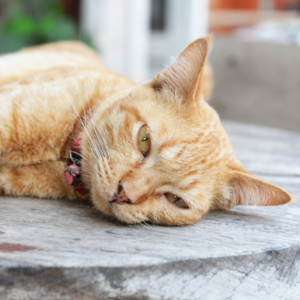 Not surprisingly, the greatest risks to pets are found around the home. Plants, foods, human medications, cleaning supplies, and automotive products are responsible for the vast majority of pet poisoning cases reported to veterinarians and poison control centers.
Not surprisingly, the greatest risks to pets are found around the home. Plants, foods, human medications, cleaning supplies, and automotive products are responsible for the vast majority of pet poisoning cases reported to veterinarians and poison control centers.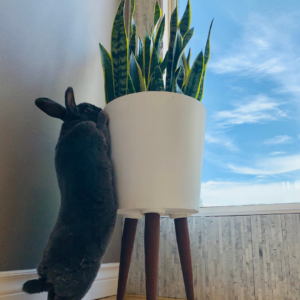 garlic, onions, yeast dough, and any processed foods containing the sweetener Xylitol.
garlic, onions, yeast dough, and any processed foods containing the sweetener Xylitol. In Case of a Pet Poisoning Emergency
In Case of a Pet Poisoning Emergency

 Dr. Alicia Simoneau’s 15-year journey with Humane Pennsylvania has been marked by a deep commitment to animal welfare and an unwavering passion for her work. As she celebrates this milestone, it’s clear that Dr. Simoneau’s contributions have been pivotal in shaping the compassionate and dynamic environment that defines Humane Pennsylvania today.
Dr. Alicia Simoneau’s 15-year journey with Humane Pennsylvania has been marked by a deep commitment to animal welfare and an unwavering passion for her work. As she celebrates this milestone, it’s clear that Dr. Simoneau’s contributions have been pivotal in shaping the compassionate and dynamic environment that defines Humane Pennsylvania today.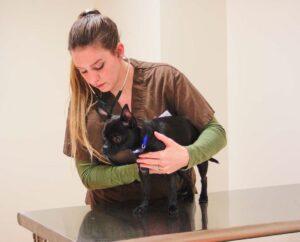
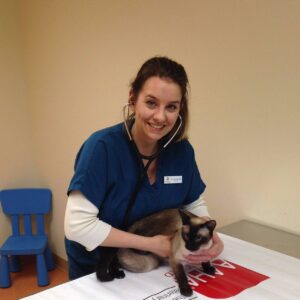 What’s one thing you’re learning now, and why is it important?
What’s one thing you’re learning now, and why is it important?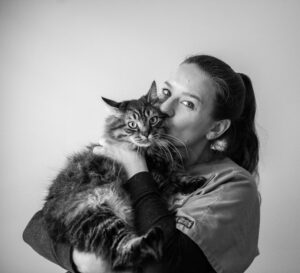

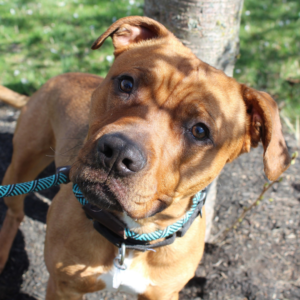 When a mosquito has a blood meal from a dog that has adult heartworms, the microfilaria is taken in by the mosquito and undergoes transformation to a larval stage, which can now be a source of infection for another dog. This larval stage parasite is injected from the mosquito to another dog with the next blood meal the mosquito takes.
When a mosquito has a blood meal from a dog that has adult heartworms, the microfilaria is taken in by the mosquito and undergoes transformation to a larval stage, which can now be a source of infection for another dog. This larval stage parasite is injected from the mosquito to another dog with the next blood meal the mosquito takes. larval stage of the heartworm before it has the chance to mature into an adult worm and cause excessive damage.
larval stage of the heartworm before it has the chance to mature into an adult worm and cause excessive damage.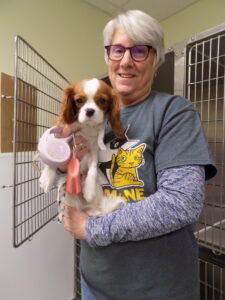 Thursday, February 23, 2024, is World Spay Day, and
Thursday, February 23, 2024, is World Spay Day, and 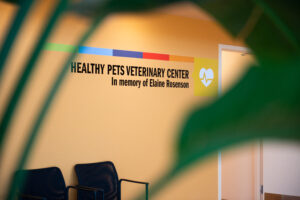
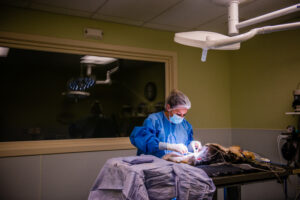
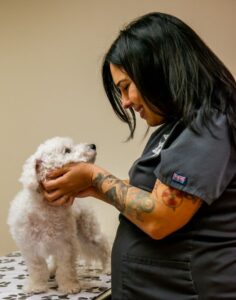 pets will prevent future costly issues such as uterine infections, cancers, and behavioral problems. For more information or to make an appointment, please visit our website:
pets will prevent future costly issues such as uterine infections, cancers, and behavioral problems. For more information or to make an appointment, please visit our website: 

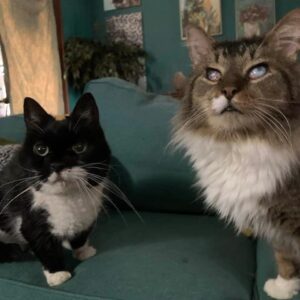 infection among other things. After her vet check, it was recommended to adopt her out as hospice care. I decided to adopt her knowing I might not have her for long. Sadly, she passed away four months later, but I made sure she spent the last few months of her life happy and loved.
infection among other things. After her vet check, it was recommended to adopt her out as hospice care. I decided to adopt her knowing I might not have her for long. Sadly, she passed away four months later, but I made sure she spent the last few months of her life happy and loved. One September morning a cat was abandoned at the shelter. We scanned the cat and found out she was adopted from our organization 15 years ago. She was frail and extremely underweight. Her name was Rapunzel but I called her Princess Thumbs because she was a polydactyl cat. After getting her blood work done it turned out that she had hyperthyroidism and needed to be on medication and a special diet. After doing some research about the disease, I adopted her. I was not sure of the outcome since she was so thin and I had no idea how long she was in this condition but I was determined to try. Unfortunately, her illness was too far gone, but she did give me two wonderful weeks. She was truly an amazing cat. I miss you, my crunchy princess.
One September morning a cat was abandoned at the shelter. We scanned the cat and found out she was adopted from our organization 15 years ago. She was frail and extremely underweight. Her name was Rapunzel but I called her Princess Thumbs because she was a polydactyl cat. After getting her blood work done it turned out that she had hyperthyroidism and needed to be on medication and a special diet. After doing some research about the disease, I adopted her. I was not sure of the outcome since she was so thin and I had no idea how long she was in this condition but I was determined to try. Unfortunately, her illness was too far gone, but she did give me two wonderful weeks. She was truly an amazing cat. I miss you, my crunchy princess. surrendered for meowing too much. Her name was Marigold. She was super sweet and did indeed “talk” a lot, which made me love her even more. After getting blood work done for her, results showed that she had hyperthyroidism. I was a little nervous because I was worried I would lose her too. I still decided to adopt her and give her a chance. Well, she is now a happy cat that “talks too much” if her bowl is empty. She will hop after you like a rabbit making sure you hear her loud and clear.
surrendered for meowing too much. Her name was Marigold. She was super sweet and did indeed “talk” a lot, which made me love her even more. After getting blood work done for her, results showed that she had hyperthyroidism. I was a little nervous because I was worried I would lose her too. I still decided to adopt her and give her a chance. Well, she is now a happy cat that “talks too much” if her bowl is empty. She will hop after you like a rabbit making sure you hear her loud and clear. During our annual 12 Days of Adoptions event during the holidays, the majority of the cats at the shelter were finding homes. There was one cat I was hoping would find her furever home since she had been overlooked for 8 months. Her name was Karma, an adorable Orange and white cat with the cutest “RBF” squishy face. Karma had a few medical issues. She was FIV+, had an old ankle injury that made her limp, and experienced bladder issues which would require a special diet and medication for life. When Christmas Eve and the last day of the adoption special arrived, I told Karma “It’s time to go home”. It’s been two months since she came home and I’m so happy I made that decision. Her health has since improved and she couldn’t be happier in her new home.
During our annual 12 Days of Adoptions event during the holidays, the majority of the cats at the shelter were finding homes. There was one cat I was hoping would find her furever home since she had been overlooked for 8 months. Her name was Karma, an adorable Orange and white cat with the cutest “RBF” squishy face. Karma had a few medical issues. She was FIV+, had an old ankle injury that made her limp, and experienced bladder issues which would require a special diet and medication for life. When Christmas Eve and the last day of the adoption special arrived, I told Karma “It’s time to go home”. It’s been two months since she came home and I’m so happy I made that decision. Her health has since improved and she couldn’t be happier in her new home.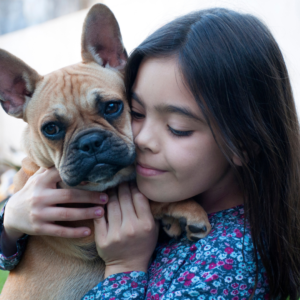 I don’t like to admit it, but as an independent rescuer for decades, I became judgmental of people who struggled to give basic care to their pets. When I met pet owners who did not match my level of pet care, it was easy for me to immediately deem them as uncaring and irresponsible without knowing any further details! However, when I started working professionally in animal welfare, I met people who had the same empathy for the animals, but with far less resources. They were rescuing outside kittens, helping injured strays or inheriting pets from friends/family that can no longer care for them and sometimes, they need a little help.
I don’t like to admit it, but as an independent rescuer for decades, I became judgmental of people who struggled to give basic care to their pets. When I met pet owners who did not match my level of pet care, it was easy for me to immediately deem them as uncaring and irresponsible without knowing any further details! However, when I started working professionally in animal welfare, I met people who had the same empathy for the animals, but with far less resources. They were rescuing outside kittens, helping injured strays or inheriting pets from friends/family that can no longer care for them and sometimes, they need a little help. 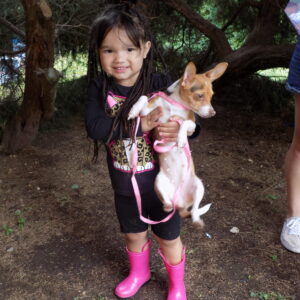 turn, leaves more space at the shelter for the animals that really need a safe place, vet care and possibly a new family (or are reunited!).
turn, leaves more space at the shelter for the animals that really need a safe place, vet care and possibly a new family (or are reunited!). 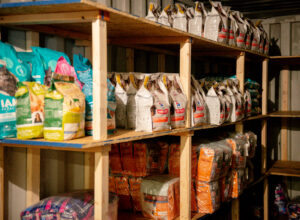 benefit from our organization’s enrollment in a food program that provides the same brand and type of food to everyone. Ongoing participation in this program results in a win-win situation:
benefit from our organization’s enrollment in a food program that provides the same brand and type of food to everyone. Ongoing participation in this program results in a win-win situation: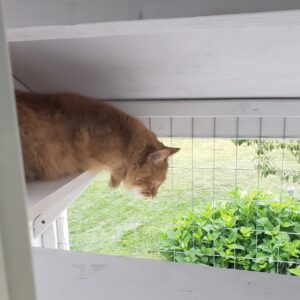 Many refer to me as a “crazy cat lady,” but I don’t mind. I have spent more than 20 years advocating for the rights of and implementing humane management of free-roaming/community/feral cats in Berks County. I took care of 29 inside cats for four years and have volunteered in animal rescue for my entire life.
Many refer to me as a “crazy cat lady,” but I don’t mind. I have spent more than 20 years advocating for the rights of and implementing humane management of free-roaming/community/feral cats in Berks County. I took care of 29 inside cats for four years and have volunteered in animal rescue for my entire life.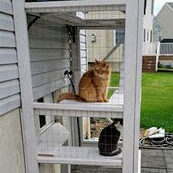
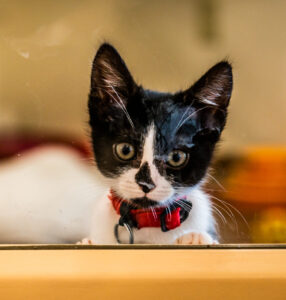 Although your cat still exhibits some wildness about them, rest assured that they are dependent on you to provide healthy food, adequate shelter, proper stimulation, and an annual veterinary exam to keep them in tip-top shape.
Although your cat still exhibits some wildness about them, rest assured that they are dependent on you to provide healthy food, adequate shelter, proper stimulation, and an annual veterinary exam to keep them in tip-top shape.



 the first non-profit walk-in animal clinic in the region. The
the first non-profit walk-in animal clinic in the region. The 
 vaccinations. Guinea pigs can’t help us pay for our work. All those things require people. And without people, we’re nothing.
vaccinations. Guinea pigs can’t help us pay for our work. All those things require people. And without people, we’re nothing.